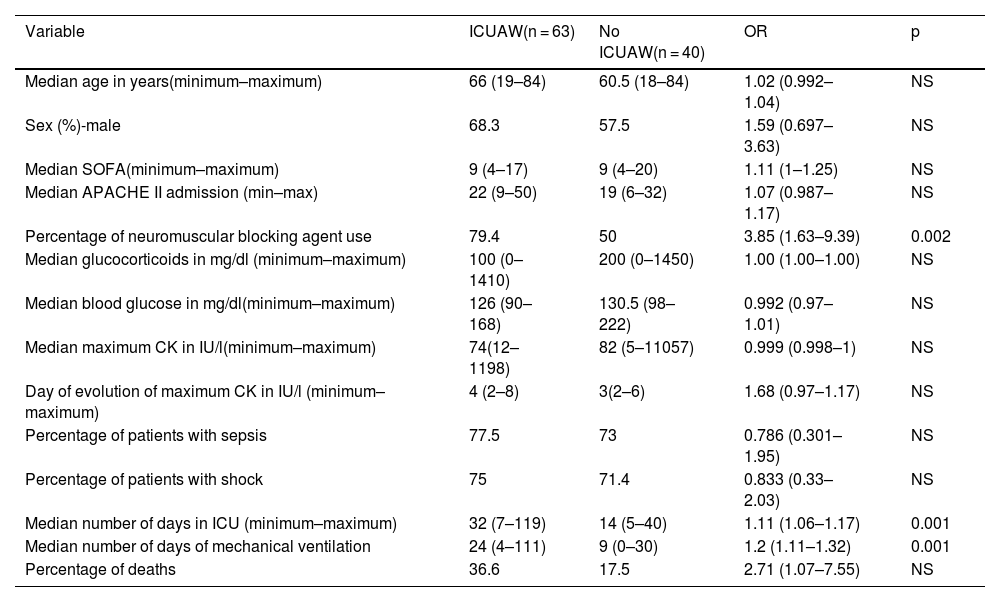Acquired critical illness weakness (AWCIP) is the most frequent neuromuscular disease in intensive care medicine departments. Its importance is given by the prolongation of hospital stay and the delayed recovery it causes to patients after hospitalization.
The main objective of this study was to investigate the association between neuromuscular blocking agents and the development of acquired weakness in critically ill patients.
Material and methodsWe conducted a prospective study of 103 critically ill patients who were periodically monitored with electromyography.
ResultsThe development of AWCIP was observed in 63 patients. The group of patients who developed AWCIP had a significantly higher utilization of neuromuscular blocking agents than the group who did not develop AWCIP [79.4% vs 50%, OR:3.85 (1.63–9.39), p < 0.02]; likewise, this group of patients had a longer ICU stay [32 days vs 14 days, OR: 1.11 (1.06–1.17), p < 0.001] and a longer mechanical ventilation time [24 days vs 9 days, OR:1.2 (1.11–1.32), p < 0.001].
ConclusionNeuromuscular blocking agents are a factor associated with the occurrence of AWCIP.
La debilidad adquirida del enfermo crítico (DAEC) es la enfermedad neuromuscular más frecuente en los servicios de medicina intensiva. La importancia de está dada por la la prolongación de la estancia hospitalaria y la tardía recuperación que ocasiona a los pacientes que después del hospitalaria. El objetivo principal de este estudio fue abordar la asociación entre bloqueantes neuromusculares y el desarrollo de debilidad adquirida del enfermo crítico.
Material y métodosRealizamos un estudio prospectivo de 103 pacientes críticamente enfermos que fueron monitorizados periódicamente con electromiografía.
ResultadosLa aparición de DAEC se objetivó en el 63 pacientes. El grupo de pacientes que desarrollaron DAEC tuvieron una utilización de bloqueantes neuromusculares significativamente mayor que el grupo que no desarrolló DAEC [79,4% vs 50%, OR:3,85 (1,63-9,39), p < 0,02]; así mismo, este grupo de pacientes tuvo una estancia en UCI más prolongada [32 días vs 14 días, OR: 1,11 (1,06-1,17), p < 0.001] y una mayor tiempo de ventilación mecánica [24 días vs 9 días, OR:1,2 (1,11-1,32), p < 0.001].
ConclusiónLos bloqueantes neuromusculares son un factor asociado a la aparición de DAEC.







